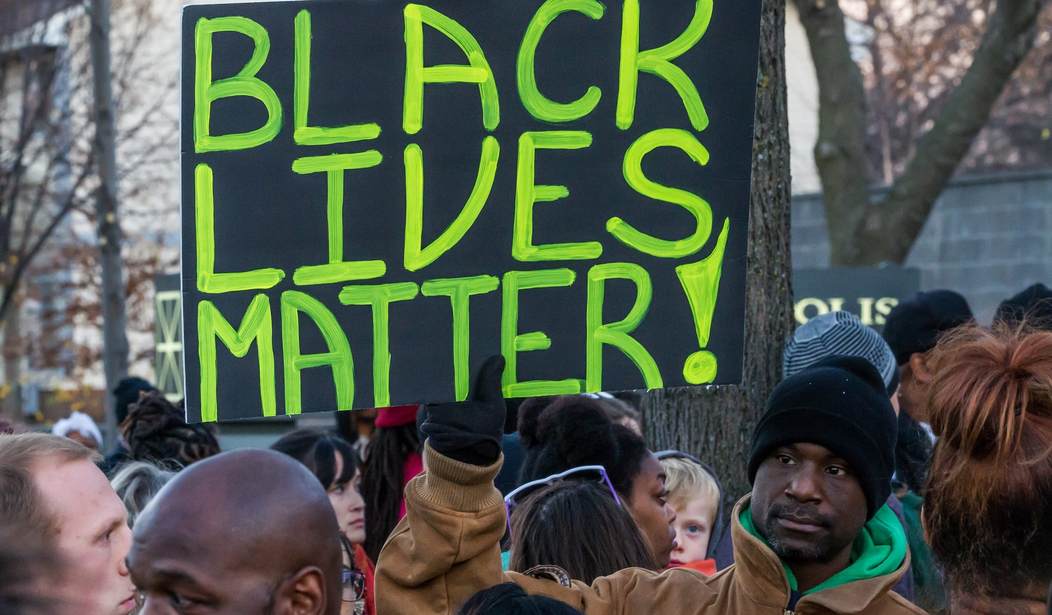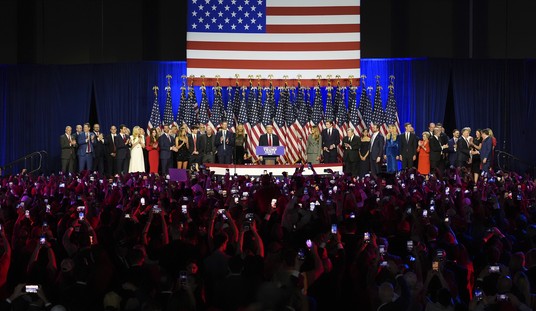You wake excited to gather your family and head to the airport. It’s the day before Christmas Eve, and you’re about to travel across the country to meet loved ones not seen since the previous year. You leave the house with plenty of time to spare. Everything’s going according to plan. Then you get to the airport.
It’s jammed, not with fellow travelers, but with political protesters engaged in an unauthorized demonstration. “No justice! No peace!” they shout, holding aloft signs reading “Black Lives Matter.” You soon realize that the crowd of agitators has overwhelmed law enforcement. The protesters bar your access to the airport. You miss your flight.
This was the experience of countless travelers meant to depart the Minneapolis/St. Paul International Airport on Wednesday as trespassers organized by Black Lives Matter Minneapolis streamed onto the premises. The protesters had been delivered by light rail trains originating from the Mall of America. The mall had been the announced target of the movement’s demonstration. But that announcement had been a diversion. The real target had been the airport.
Wednesday’s melee followed days of preparation and legal drama. After BLM announced their intention to protest at the Mall of America, the mall’s management reiterated that protest was not allowed on their premise. The standoff proved similar to events a year prior, when BLM had invaded the mall on the Saturday before Christmas. That incident had led to several criminal charges against protest organizers, most of which were dropped by a Hennepin County judge. The ruling in that case indicated that the mall had not done enough to prevent the incursion. From station KMSP in Minneapolis:
The judge [noted] that the mall seemed to allow the demonstration for the first half hour by not issuing any explicit orders to leave. And that the MOA did not pursue any court action before the protest to enjoin the demonstration.
Taking the advice, the mall sought a restraining order to prevent Wednesday’s protest from taking place. From the Washington Times:
If approved by a Hennepin County judge, activists would be prohibited from engaging, soliciting or encouraging any demonstration on mall property on Wednesday, and also be required to purge details of their scheduled rally from social media.
Alas, the judge rejected the mall’s request, opting only to bar three specific BLM organizers from participating in the demonstration. We saw on Wednesday how ineffective that restriction was. Since restraining orders and other legal means have failed to protect property and infrastructure, it seems clear that a new approach is called for. Innocents can no longer be allowed to suffer the abuse of Black Lives Matter.
The Problem
Agitators operating under the banner of Black Lives Matter have repeatedly broken the law. They have done so at the direction of organizers who buffer themselves from accountability by leveraging the limitations of law enforcement. Consider this New York Times report on the restraining order recently granted by a Hennepin County judge:
The decision bars three of the organizers — Michael McDowell, Miski Noor and Kandace Montgomery — from participating in the protest. Black Lives Matter has vowed to go forward with the demonstration as planned. The mall’s complaint had included the group itself as a defendant, but Judge Karen A. Janisch of Hennepin County ruled that it was not an entity capable of being sued.
“The Court does not have a sufficient basis to issue an injunction as to Black Lives Matters (sic) or to unidentified persons who may be acting as its agents or in active concert with the Black Lives Matters movement,” she wrote.
Because BLM is not a legal entity, it cannot be effectively restrained. There is no headquarters to raid, no officers to censure, no assets to seize. This is by design. By keeping the organization informal, its collective actions cannot be attributed to its leaders. In the eyes of the law, every person acting at the behest of Black Lives Matter is acting individually.
This presents the Mall of America and other private venues with a logistically impossible task, individually trespassing BLM protesters one at a time. There’s nothing else they can do, no other protection the law provides. Under the status quo, property rights are not protected. Furthermore, public infrastructure like interstate freeways, airports, and police precincts are vulnerable to coordinated disruptions by organizers who are not held accountable.
They Will Not Stop
Before considering a solution to this problem, we need to consider what really motivates the Black Lives Matter movement. Their sudden shift from the Mall of America to the airport has not been their only diversion. The entire “racial justice” narrative is a smokescreen. We’re dealing with Marxist radicals who oppose private property and capitalism. Their use of trespass is more than a tactical choice; it’s a political statement. To their minds, there is no such thing as trespass, because there should be no such thing as property.
The mindset is articulated in, of all places, a white man’s blog. Writer Ryan Williams-Virden, a teacher in North Minneapolis, wrote a post addressed to “my fellow whites” offering “4 Reasons You Should Be at The Mall of America Wednesday.” Both there and in a radio interview with yours truly, Virden equated private property with white supremacy and slavery. He writes:
That the Mall is private property with the legal right to bar protesters does not mean it is wrong to be there demanding justice. Legality does not equal morality. Lest we forget: slavery and Jim Crow were both legal.
Williams-Virden could be forgiven for hyperbole if his intent was to demonstrate that some legal acts have been immoral. But it goes beyond that. He maintains that private property is immoral in and of itself. From our discussion on Twin Cities News Talk AM 1130 (starting at 18:00):
As far as the private property argument, I think that is an example of a manifestation of what I’ll call “whiteness.” Private property has historically been limited to white people/… I’m talking about the legal defined definition of whiteness and those who could fit in it, those who could own property, those that could testify in court, those that could hold other human beings as property. So that is a foundational element when we talk about private property. When Europeans came here, to this continent, they invoked private property as a way to steal land from native people. And I think, if we’re going to hide behind the private property argument, we should look at the history of private property in this country.
Never mind the absurdity of citing “stolen land” in a critique of property. (How can you steal unless there was a property claim?) The logic of Williams-Virden’s position is not the issue. His ideas are notable only as evidence of what Black Lives Matter believes. Williams-Virden’s beliefs echo those of local BLM organizer Nekima Levy-Pounds, who has expressed similar critiques of private property on her podcast. Consider also the rhetoric of BLM organizer Kandace Montgomery reported by NBC News after Wednesday’s protest:
“When you disrupt their flow of capital … they actually start paying attention,” she said. “That’s the only way that they’ll hear us.”
Their word choice is intentional — disrupt, confront, force. These are words of aggression. They describe violation, encroachment, and trespass. These are the objectives of the Black Lives Matter movement, to violate property, to disrupt commerce, to block travel, to cause palpable harm to others.
This is why descriptions of “non-violence” and “peaceful protest” are flat-out lies. One cannot peacefully trespass. To trespass is to violate another person’s rights, and violation is the essence of violence. Like the mafia, Black Lives Matter exists for the explicit purpose of organized violation. We must treat them accordingly. Which bring us to…
The Solution
Law enforcement, judges, and property owners require new tools to protect property rights and maintain the integrity of public infrastructure. As established above, Black Lives Matter organizers buffer themselves from any responsibility for collective action by operating informally. We’ve seen this kind of thing before. It’s called organized crime.
What we need is a provision similar to the RICO Act. From Wikipedia:
The Racketeer Influenced and Corrupt Organizations Act, commonly referred to as the RICO Act or simply RICO, is a United States federal law that provides for extended criminal penalties and a civil cause of action for acts performed as part of an ongoing criminal organization. The RICO Act focuses specifically on racketeering, and it allows the leaders of a syndicate to be tried for the crimes which they ordered others to do or assisted them in doing, closing a perceived loophole that allowed a person who instructed someone else to, for example, murder, to be exempt from the trial because he did not actually commit the crime personally.[1]
Currently, protest organizers direct acts of civil disobedience without assuming any responsibility for the consequences. I tell you to go protest. You do it. You get arrested. Maybe we go together, both get arrested, but each gets charged equally in spite of the fact that it was my idea. That has to change.
We need a provision enabling law enforcement to aggressively pursue the organizers of trespass and disruption. Penalties should be harsh, including prison time. Government’s one job is to protect individual rights, including property rights and freedom from unlawful disruption. Under the status quo, it has failed.
But, But, What About Freedom of Speech?
This is not about free speech. Even those critical of BLM bristle at any suggestion perceived to restrict protest. However, we’re not talking about new restrictions. We’re talking about new measures to enforce existing restrictions. As things stand, it is not legal to trespass and disrupt public infrastructure. It is not legal to do what BLM is doing. They get away with it, not because it is legal, but because law enforcement lacks the tools to effectively protect property and infrastructure.
BLM organizers were publicly indignant toward the restraining order issued against them in Hennepin County, but they didn’t care, because they knew it would not stop them. They were going to execute their plan regardless. That plan was illegal. It was a crime. New measures to prosecute that crime would not present new restrictions on speech.
Let’s be clear regarding what free speech is or, more importantly, what it is not. Free speech is not a license to trespass. It is not a license to disrupt public accommodations. It is not a license to violate your neighbor’s property. Free speech means that you can say what you want without being punished by the state for what you said. It has nothing to do with where you say it, and does not guarantee either a venue or an audience.
If BLM protesters start getting arrested for what they say, I’ll join them in decrying a violation of free speech. No such violation has been proposed here. We’re talking about preventing violations. When Williams-Virden writes of “confronting” white people and “forcing” them to acknowledge BLM rhetoric, he writes of violence. What other effect does force have?









Join the conversation as a VIP Member